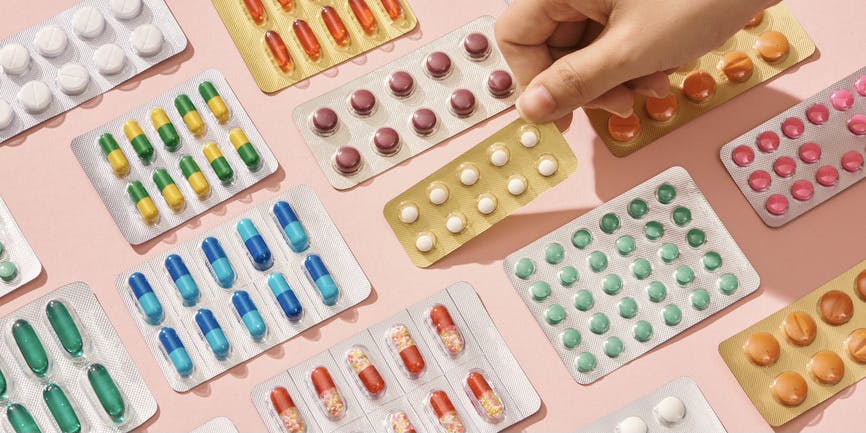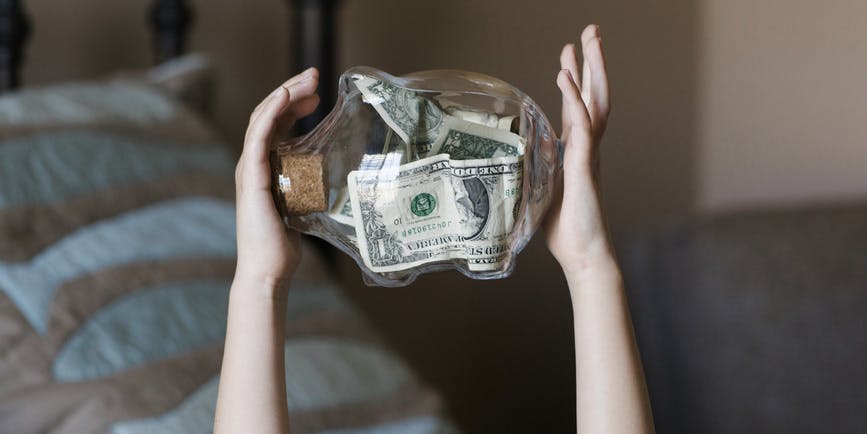
Using a Drug Discount Card — How It Works

So, you're ready to take a $15 online medical consultation with Dr. B but worried your insurance won't cover the medication you're hoping to have prescribed. Or maybe you don't have insurance!
What do you do?
Almost half of adults in the U.S. take at least one prescription medication every month—and one in four have a hard time paying for it. So if you're wary of filling a prescription because of the cost, you’re not alone!
Fortunately, medication cash cards can help make prescription costs much more affordable. And with Dr. B, you don't even need to search the web for the best deal before starting your online consultation.
Instead, we show you the lowest prescription costs at your local pharmacies before you finalize your consultation. If a provider decides that a prescription treatment is appropriate and sends the prescription to your pharmacy, we'll email you a drug discount card to guarantee that you get that low price once you reach the pharmacy counter.
Want to make sure you understand all the details?
Here’s what to know about how prescription savings cards work.
What are drug discount cards?
Drug discount cards—or medication cash cards—are coupon cards you can use when paying for prescription medications. They can save you money if you don’t have insurance. Or they can lower RX prices if your insurance company doesn’t cover a specific medication.
You can get these discount cards no matter your income or insurance status. And they’re free—so you don’t pay any upfront costs.
Drug discount cards may also:
- Reduce the cost of drugs not covered by Medicare Part D plans, like those for hair loss and erectile dysfunction.
- Include coupons for Plan B, emergency contraceptives and other reproductive health treatments.
- Help lower pet medication costs—which are rarely covered by pet insurance plans.
How drug discount cards work
Prescription prices are determined by drug manufacturers, pharmacies and pharmacy benefits managers (PBMs).
- The PBM negotiates discounted prices between manufacturers and pharmacies. When it comes to drug discount cards, they can secure savings of up to 80% off the retail price of brand and generic medications.
- The PBM then works with marketing companies to promote the discount program. Search online for discount drug cards, and these marketing programs are why you’ll find top competitors advertised first.
- When a patient uses the discount card for a prescription, the discount company receives a small percentage of the profit.
Where can you use drug discount cards?
Most major pharmacies accept these medication cash cards.
All you need to do is present the RX card to your pharmacist before filling or paying for your prescription. The pharmacist will enter the discount card information into their system. Then they’ll deduct the discount from your out-of-pocket medication cost.
Like all businesses, pharmacies need to attract customers with competitive pricing. Discount card programs can drive traffic and build customer loyalty. But the discount company takes a cut of the pharmacy’s profit each time a discount card is used.
Many large pharmacy chains can afford this loss. But independent pharmacies sometimes lose money on the transaction. If you use a small family-run pharmacy, ask if they accept discount cards before filling your prescription.
Other points to consider
Drug discount cards can make a huge difference in lowering your prescription costs. With so many options out there, here are a few points to consider before you get to the register.
- Medication costs fluctuate. Even if you use the same medication cash card, your prescription price may differ from one fill to another. Always search for the lowest price before refilling your prescription.
- They’re not insurance plans. Drug discount cards can’t be used for medical consultations or procedures. They can’t be used with health insurance.
- The $ won't go toward your deductible: If you have insurance but use a discount card, the cost usually doesn’t count toward your deductible.
- They don’t always save money. Most medications cost less with insurance. When you use a discount card for one prescription, your pharmacy may keep it on file and use it (instead of your insurance) when you fill a different prescription. Always ask which price is lower before you pay.
- They don’t cover all medications. Some prescription cards also offer significant discounts for specific drugs (because they’ve made deals with the drug manufacturer).
- They’re not subject to HIPAA. You don’t have to share your social security number or financial information to get these cards. But discount companies are not subject to HIPAA privacy standards. So they may share or sell your personal prescription information to third-party companies.
The best drug discount cards
There are many medication cash cards out there. Some popular options include:
- SingleCare pharmacy savings card
- AARP prescription discount card
- Kroger discount card
- Walmart pharmacy discount card
- ScriptSave / WellRx
- GoodRx coupon cards
Dr. B has partnered with the SingleCare, CareCard and RxLess (RxLess) discount card companies because we’ve seen how well they lower prescription costs.
Curious about discount coupon price differences? Learn more in this Dr. B article.
Other medication discount options
Medication cash cards can then help lower your prescription costs. But they’re not the only way to save. Here are a few other options:
Dr. B's affordable online care. Dr. B’s mission is to help make healthcare affordable and accessible. We offer $15 online health assessments for a variety of common conditions. And we have a No-Cost Care program for those who qualify based on financial need.
Manufacturer-sponsored prescription coupons. Drug companies sometimes offer coupons for their brand medications. These discounts are often temporary—so the coupon may expire while you still need the medication. But they work with insurance plans. So they can be the best option for expensive medications.
Pharmacy savings programs. Some pharmacies offer their own discount programs (often for generic medications). They can help lower insurance copay costs. Without insurance, they can lower prescription costs for chronic conditions over time. Pharmacies are subject to HIPAA privacy standards. So they protect your personal information, too.
Patient assistance programs. Some drug manufacturers offer discounts for those who can’t afford their medications. You may even get your medication for free. Some non-profit organizations offer income-based discounts, too.
Sign up for the free Dr. B newsletter for a weekly report on the latest in healthcare + research-based advice for staying healthy and mentally well.


